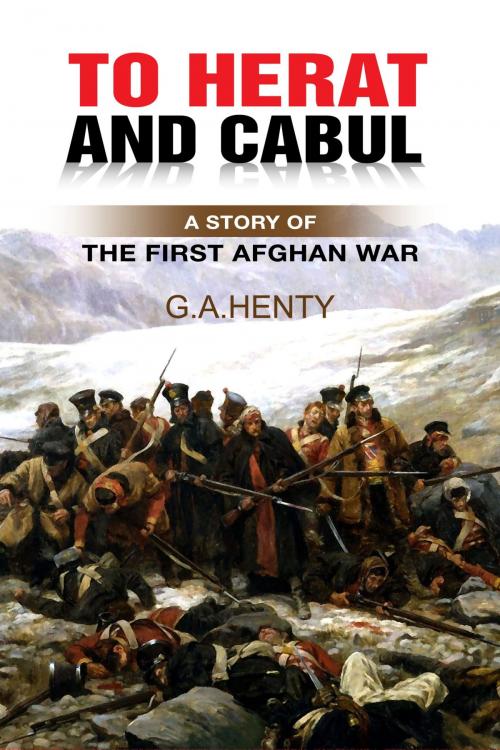To Herat and Cabul: A Story of the First Afghan War
Complete with original illustrations
Fiction & Literature, Military, Classics, Historical| Author: | G.A. Henty | ISBN: | 1230003356494 |
| Publisher: | Freeday Shop | Publication: | August 9, 2019 |
| Imprint: | Language: | English |
| Author: | G.A. Henty |
| ISBN: | 1230003356494 |
| Publisher: | Freeday Shop |
| Publication: | August 9, 2019 |
| Imprint: | |
| Language: | English |
In the military history of this country there is no darker page than the destruction of a considerable British force in the terrible defiles between Cabul and Jellalabad in January, 1842. Of all the wars in which our troops have taken part never was one entered upon so recklessly or so unjustifiably. The ruler of Afghanistan, Dost Mahomed, was sincerely anxious for our friendship. He was alarmed at the menacing attitude of Russia, which, in conjunction with Persia, was threatening his dominions and intriguing with the princes at Candahar. Our commissioner at Cabul, Mr. Burnes, was convinced of the Ameer's honesty of intention, and protested most strongly against the course taken by the Indian government, who determined upon setting up a discredited prince, who had for many years been a fugitive in India, in place of Dost Mahomed.
In spite of his remonstrances, the war was undertaken. Nothing could have been worse than the arrangements for it, and the troops suffered terribly from thirst and want of transport. However, they reached Cabul with comparatively little fighting. Dost Mahomed fled, and the puppet Shah Soojah was set up in his place; but he was only kept there by British bayonets, and for two years he was so protected. Gradually, however, the British force was withdrawn, until only some five thousand troops remained to support him. Well led, they would have been amply sufficient for the purpose, for though the Afghan tribesmen were dangerous among their mountains, they could not for a moment have stood against them in the open field. Unhappily the general was old and infirm, incapable of decision of any kind, and in his imbecile hands the troops, who in October could have met the whole forces of Afghanistan in fight, were kept inactive, while the Afghans pillaged the stores with the provisions for the winter, and insulted and bearded them in every way. Thus a fine body of fighting men were reduced to such depths of discontent and shame that when the unworthy order for retreat before their exulting enemy was given they had lost all confidence in themselves or their officers, and, weakened by hunger and hampered by an enormous train of camp followers, they went as sheep to the slaughter in the trap the Afghans had prepared for them. It would almost seem that their fate was a punishment for the injustice of the war. Misfortunes have befallen our arms, but never one so dark and disgraceful as this. The shame of the disaster was redeemed only by the heroic garrison of Jellalabad, which, although but one-fourth of the strength of that at Cabul, sallied out after a noble defence and routed the army which Dost Mahomed's son Akbar had assembled for their destruction.
In the military history of this country there is no darker page than the destruction of a considerable British force in the terrible defiles between Cabul and Jellalabad in January, 1842. Of all the wars in which our troops have taken part never was one entered upon so recklessly or so unjustifiably. The ruler of Afghanistan, Dost Mahomed, was sincerely anxious for our friendship. He was alarmed at the menacing attitude of Russia, which, in conjunction with Persia, was threatening his dominions and intriguing with the princes at Candahar. Our commissioner at Cabul, Mr. Burnes, was convinced of the Ameer's honesty of intention, and protested most strongly against the course taken by the Indian government, who determined upon setting up a discredited prince, who had for many years been a fugitive in India, in place of Dost Mahomed.
In spite of his remonstrances, the war was undertaken. Nothing could have been worse than the arrangements for it, and the troops suffered terribly from thirst and want of transport. However, they reached Cabul with comparatively little fighting. Dost Mahomed fled, and the puppet Shah Soojah was set up in his place; but he was only kept there by British bayonets, and for two years he was so protected. Gradually, however, the British force was withdrawn, until only some five thousand troops remained to support him. Well led, they would have been amply sufficient for the purpose, for though the Afghan tribesmen were dangerous among their mountains, they could not for a moment have stood against them in the open field. Unhappily the general was old and infirm, incapable of decision of any kind, and in his imbecile hands the troops, who in October could have met the whole forces of Afghanistan in fight, were kept inactive, while the Afghans pillaged the stores with the provisions for the winter, and insulted and bearded them in every way. Thus a fine body of fighting men were reduced to such depths of discontent and shame that when the unworthy order for retreat before their exulting enemy was given they had lost all confidence in themselves or their officers, and, weakened by hunger and hampered by an enormous train of camp followers, they went as sheep to the slaughter in the trap the Afghans had prepared for them. It would almost seem that their fate was a punishment for the injustice of the war. Misfortunes have befallen our arms, but never one so dark and disgraceful as this. The shame of the disaster was redeemed only by the heroic garrison of Jellalabad, which, although but one-fourth of the strength of that at Cabul, sallied out after a noble defence and routed the army which Dost Mahomed's son Akbar had assembled for their destruction.















